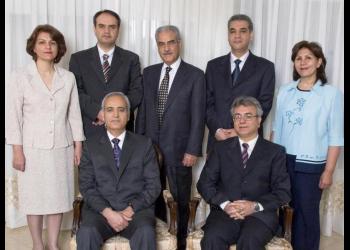For seven years, seven Baha'i leaders have been wrongly imprisoned in Iran.
Their 20-year sentences are the longest given to any current prisoners of conscience in Iran. Their harshness reflects the Government’s resolve to oppress completely the Iranian Baha'i community, which faces a systematic, “cradle-to-grave” persecution that is among the most serious examples of state-sponsored religious persecution in the world today.
Baha'i communities around the world continue to call for their immediate release – and the release of all innocent prisoners of conscience in Iranian prisons.
Six of the seven Baha’i leaders were arrested on 14 May 2008 in a series of early morning raids in Tehran. The seventh had been detained two months earlier on 5 March 2008.
Since their arrests, the seven – whose names are Fariba Kamalabadi, Jamaloddin Khanjani, Afif Naeimi, Saeid Rezaie, Mahvash Sabet, Behrouz Tavakkoli, and Vahid Tizfahm – have been subject to an entirely flawed judicial process that has completely ignored international requirements for human rights and legal protections.
During their first year in detention, the seven were not told of the charges against them and they had virtually no access to lawyers. Their trial, conducted over a period of months in 2010 and amounting to only six days in court, was illegally closed to the public, demonstrated extreme bias on the part of prosecutors and judges, and was based on non-existent evidence.
“The bill of indictment that was issued against our clients…was more like a political statement, rather than a legal document,” said one of their lawyers, Mahnaz Parakand. “It was a 50-page document…full of accusations and humiliations leveled against the Baha’i community of Iran, especially our clients. It was written without producing any proof for the allegations.”
The seven continue to endure harsh conditions in two of Iran’s most notorious prisons. The five men are incarcerated at Gohardasht prison in Karaj, a facility known for its overcrowding, lack of sanitation, and dangerous environment. The two women remain at Tehran’s Evin Prison, infamous as a place where brutal interrogations and torture are common.
A global outcry about their unjust imprisonment continues.
In May 2013, four top UN human rights experts called for their immediate release. In May 2014, influential Iranian personalities, human rights activtists, journalists and a prominent religious leader boldly gathered at the home of one of the seven to commemorate the sixth anniversary of their imprisonment. Later that year, faith leaders from every major religion gathered in London to call for their release.
Since 1979, more than 200 Baha’is have been executed, hundreds more imprisoned and tortured, tens of thousands denied employment, education, freedom of worship, and other rights – all solely because their religion is declared to be a “heretical sect.”
This persecution has intensified in recent years. Since 2005, more than 700 Baha’is have been arrested, and, as of April 2015, at least 100 Baha’is, including the seven, are wrongfully imprisoned.
The increase in arrests has been accompanied by a rising tide of violence against Baha’is, marked by incidents that include arson attacks, anti-Baha’i graffiti, hate speech, the desecration of Baha’i cemeteries, and assaults on schoolchildren.
The persecution of Iranian Baha’is extends from cradle to grave. Baha’i infants have been imprisoned along with their mothers. In primary and secondary school, Baha’i children are frequently harassed and insulted by teachers. Young people are denied rightful access to higher education. Adults are banned from government employment and discriminated against in virtually every other sector of the economy. Baha’i marriages are not recognized. The elderly are denied rightful pensions. This all-encompassing discrimination extends even to death: Baha’is are denied the right to proper burial, and unprosecuted arson and vandalism at Baha’i cemeteries carries the persecution beyond the grave.
